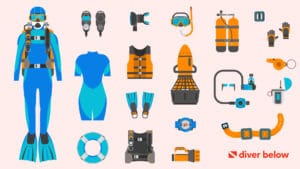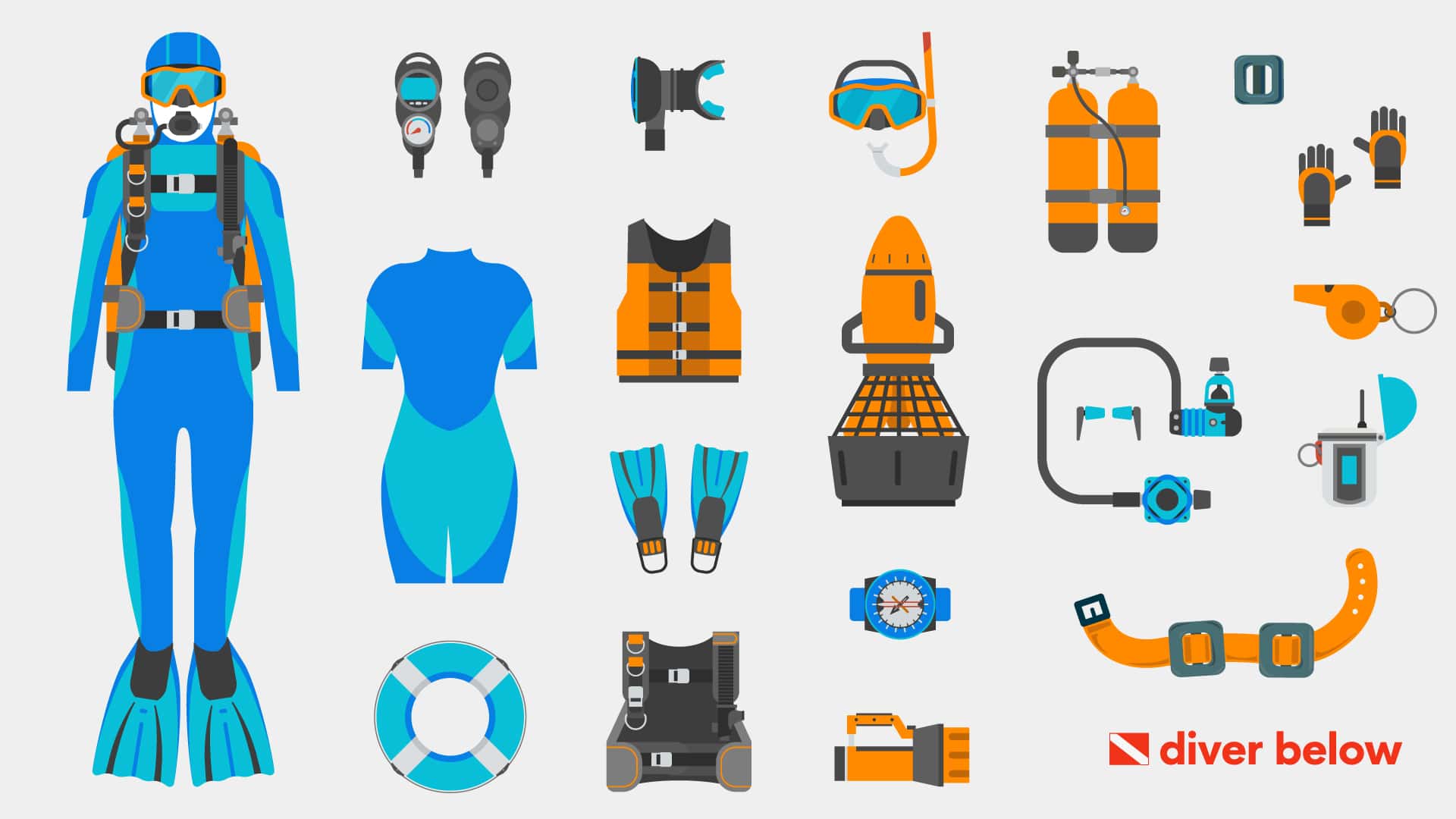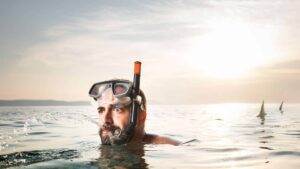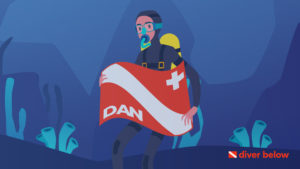For someone just starting on their journey as a diver, navigating the practical aspects of finding the best scuba gear and buying it can represent a challenge.
It can seem that everyone is more in the know than you are, which might make you worry that you’re potentially getting ripped off every purchase you make.
In this guide, we’ll go over what newcomers need to know about buying dive equipment.
That means we’ll go over the pieces of equipment you absolutely need to have, those you can wait a while before purchasing, and how much everything should cost.
Contents
What is Scuba Diving Gear?
Simply put, scuba gear is everything that a person needs to spend extended amounts of time underwater.
However, it’s a little bit more complicated than that because some items are necessary for some types of dives but not others, while some devices aren’t ever needed but can make diving easier.
For example, there are specifically designed gloves that are good for underwater use, but you won’t always need to be wearing them.
On the other hand, some gear is absolutely essential for scuba diving, like scuba tanks, a scuba regulator, and masks and fins.
As they gain experience, scuba divers get a sense of what they need for a safe and enjoyable dive.
What Gear Do I Need?
There isn’t any easy answer to this question because the gear you’ll need to go on a particular dive depends on lots of factors like dive time and dive depth, as well as where you are.
Gear is Dependent on Type of Diving
You aren’t going to need the same type of gear for a free dive as you will for a deep dive.
Many types of diving require specialized equipment.
So, when you’re choosing what gear to buy, first think about what type of diving you’re going to be doing the most.
Just get what you need for that type, then rent the additional equipment on those rare occasions you go for a different type of dive.
Gear is Dependent on Location of Diving
One of the largest factors that determine what gear you will need is the temperature of the water you’ll be in.
Wearing warm enough gear for the conditions isn’t just about comfort, but it’s also about safety.
Spending extended amounts of time in cold water while improperly dressed puts you at risk for hypothermia and other complications.
Likewise, you don’t want to be in warm water wearing too much.
In this section, we’ll go over the gear you should plan on using in tropical water conditions, temperate water conditions, and cold water conditions.
1. Tropical Water Diving
Since tropical water is the most forgiving to go scuba diving in, you don’t need too much-specialized equipment.
You can wear a thin and streamlined wetsuit, so you don’t have to insulate your gear against the cold (as we’ll see in later sections).
To qualify as tropical water, it must be above 24 degrees Celsius.
So make sure to check the up-to-date water temperature when making plans.
2. Temperate Water Diving
In temperate water, you want to make sure to use equipment that strikes a balance between warmth and flexibility.
Since there’s a wide range of temperate conditions–which exist in water between 24 degrees Celsius and 15 degrees Celsius–temperate scuba equipment has to be useful across all of them.
3. Cold Water Diving
Coldwater diving requires the most specialized equipment out of the three environmental conditions we’ve gone over.
It’s important to use cold water diving gear whenever you’re out in temperatures 14 degrees Celsius and below.
Not only is it important to stay warm by wearing a diving jacket and hood, but you also need to make sure your breathing equipment isn’t vulnerable to freezing.
Parts of your life support system, like the breathing regulator and inflator hose, can freeze shut if cold water diving is not their specialization.
In particularly cold temperatures barely above freezing, you’ll want to be wearing a drysuit rather than a wetsuit.
Some specialized drysuits even have internal heating systems to keep you warm.
Essential Scuba Diving Gear: The Basics
In this section, we’ll cover the basic scuba equipment you’ll need to get in the water.
Keep in mind that even after you own all the entries on this list, you’ll still have to rent some of the more expensive and advanced items needed for scuba diving.

Scuba Mask
Scuba masks are perhaps the most recognizable pieces of underwater equipment.
When buying a scuba mask, you’ll have lots of options but it’s important (and sometimes difficult) to find one that fits properly.
A scuba mask keeps you able to see clearly while underwater.
The nose compartment of a scuba mask is also essential for diving, allowing you to equalize the pressure in your mask as you go deeper.
What to Look For
When you’re buying a scuba mask, ensure that it’s the right size and shape to form a watertight seal over your face.
You don’t want any gaps into which water can flow.
There’s a procedure to check whether a scuba mask will fit you, and it doesn’t begin with tightening the straps as much as possible.
Instead, you want to place a candidate mask on your face while looking up at the ceiling without doing up the straps.
Does it rest on your face evenly and without any gaps?
If so, try the same thing with the snorkel attached to the mask and in your mouth.
The next step is to place the mask on your face, again without straps, while looking forward.
Next, see if a gentle inhale through your nose will cause the mask to seal to your face.
Finally, if everything still seems to be fitting properly, give it a try with the straps.
Your nose shouldn’t come into contact with the rubber lining of the nose pocket and everything should feel comfortable.
Once you’ve found a few masks that fit properly, you can choose between them by looking at their features.
For instance, do you want a completely clear mask or one that has a bit of tint?
Aesthetic preferences can also come into play here as long as everything fits properly.
Price Range
Most scuba masks cost around $50, but the best scuba masks can fetch upwards of $200.
We’d highly suggest investing into a good mask, so that you can avoid common problems underwater.
The last thing you’ll want to do is scrub a dive because of leaking or poor fit.
Snorkel
Snorkels are an important piece of equipment for scuba diving that is more complex than they look.
In a basic sense, they are just tubes that you use to breathe while just under the surface.
But, there are several different types of snorkel that have different features and behave differently while in use.
The main purpose of a snorkel in a diving context is to save the air in your tanks while you’re swimming across the top of the water.
What to Look For
If you’re just starting as a diver, you don’t need to get any kind of specialized snorkel.
Rather, you want to look for a basic model that seems easy and comfortable for you to use.
Also, it’s usually better to buy a mask before snorkeling, as the shape of the mask might affect how easy to use and comfortable the snorkel is.
Price Range
Snorkels usually cost between $30 and $90.
Scuba Fins
Once you get used to swimming with fins on, you’ll never want to go back to using just plain old feet again.
Fins help you swim more efficiently by increasing the amount of power that moves from your kicking legs to the water behind you.
What to Look For
There’s perhaps the widest space for personal preference when it comes to choosing fins.
That’s why it’s a good idea for you to try out a few different types of fins before deciding what you want to go with.
It’ll be difficult to know whether you prefer open-heel or full-foot fins in a showroom. You have to try them out in the water.
You’ll also want to consider how large and stiff your new fins should be.
The stronger the swimmer you are, the bigger the size and stiffer the flex of your fins should be.
Price Range
Scuba fins cost between $75 and $250.
Booties
Booties, or little wetsuits for your feet, are a must-have for cold water diving (and can make long dives in temperate water easier).
The feet are one of the areas of the body that loses heat the fastest.
By insulating them from cold water, you’ll greatly extend your dive time.
What to Look For
A good fit is an overriding consideration when choosing booties.
You want to make sure your feet fit comfortably into them without too much pinching or too much loose space.
Price Range
Scuba fins cost between $20 and $50.
Wetsuit or Rash Guard
Wetsuits are skin-tight exposure suits that help keep you warm underwater.
They’re very useful because we lose heat very quickly while in water.
Much quicker, in fact, than in cold air.
They work by keeping a thin layer of water between your body and the suit, which warms up and insulates your body from the colder water outside the suit.
A rash guard, on the other hand, is much more similar to a spandex shirt and pants.
If you’re diving in very warm water, you might prefer a rash guard because you retain a full range of motion with one on.
What to Look For
Just like a formal suit or dress, a wetsuit should fit your body type.
If it’s too tight, the wetsuit will be uncomfortable and restrict blood flow.
On the other hand, wetsuits that are too loose will let in too much water to keep you warm and restrict your movement.
At the end of the day, you’re looking for a wetsuit you can feel comfortable in for long periods.
Price Range
Wetsuits cost between $70 and $650.
Cheap rash guards usually cost less than $35, but the best rash guards oftentimes run much more than that.
Mesh Bag
A mesh bag makes it much easier to carry all your equipment to and from dives.
The fact that it’s open to air gives your gear a chance to dry out without the risk of mold.
What to Look For
When you’re shopping for a mesh bag, make sure to find a heavy-duty bag that has lots of room for gear.
Price Range
A mesh bag costs between $25 and $45.
Scuba Diving Gear: Leveling Up
Once you’ve collected all the basic gear, you might want to pick up some more advanced items.
This is a prudent step if you’ve found that you love scuba diving and plan on going many more times.
In that situation, it makes financial sense to buy your equipment rather than renting it.
Scuba BCD
A BCD, or buoyancy compensator, is a harness for your gear that performs many other functions.
Most importantly, your BCD allows you to regulate your buoyancy according to depth.
This means it can keep you floating at the top of the water, but also prevent your natural buoyancy from bringing you towards the surface when you’re further down.
What to Look For
First of all, you need to find a BCD that fits comfortably.
When you’re checking out potential BCDs, you should wear your wetsuit underneath.
Otherwise, you’ll get a distorted picture of how well it fits.
Further, make sure that the BCD is compatible with all the other gear you own.
Price Range
A BCD costs between $350 and $1000.
Scuba Regulator
On the most simple of levels, a scuba regulator is the top of the hose through which you breathe underwater.
However, a scuba regulator is better described as a complex piece of equipment that converts the pressurized air in your tanks to ambient pressure.
What to Look For
The major differentiation between alternative regulators is the amount of volume they can deliver at different depths.
The science of it is a bit complicated, but suffice to say that a regulator has to work harder to get you the proper amount of air at lower depths.
Furthermore, the highest quality regulators can deliver a lot of air even when your tank doesn’t have a lot of pressure left.
Price Range
A scuba regulator costs between $225 and $1600.
SPG or Dive Computer
Dive computers have made going on deep dives much easier–and therefore less dangerous–by making it easier to keep track of dive time and decompression time.
Once you input certain information into your dive computer, like how much air your tanks have and how deep you’d like to go, it can calculate how long you’ll have to spend at each depth.
Not only that, a wrist-held dive computer will alert you when your time at a certain depth is running out.
What to Look For
When choosing a dive computer, you want to make sure that it’s complex enough to do everything you need it to do.
On the other hand, make sure that your new dive computer isn’t too complicated for you to understand.
Trust me, ease of use comes in handy when you’re diving.
Price Range
The best dive computers cost between $300 or $1300.
How Much Does Scuba Diving Gear Cost?
Scuba diving is a specialized sport that requires a lot of equipment, so as a result there’s a high cost of entry.
Luckily, there’s also the option of renting scuba gear, which can bring down costs.
How Much Does Scuba Diving Gear Cost to Buy?
The basic personal scuba gear that you must buy for yourself, like dive fins, a mask, and a wetsuit, will usually cost between $200 and $300.
If you go down this route, though, you’ll still have to rent tanks, buoyancy control devices, and mouthpieces.
If you decide to buy all of your equipment outright, the price for a mid-range system will be between $1000 and $1500.
How Much Does Scuba Diving Gear Cost to Rent?
The cost of renting scuba gear depends on exactly where you are, but it will generally cost between $25 and $60 per day of use.
That price is for a full set, however, and the more components you have, the less the rental price will end up being.
Renting vs Buying
In this section, we’ll look at the decision of whether to rent or buy scuba equipment.
Pros and Cons of Renting Scuba Gear
The largest pro to renting scuba gear is the lower upfront cost of spending a day scuba diving. THe
Pros and Cons of Buying Scuba Gear
On the other hand, once you buy scuba gear you’ll be able to use it over and over again for many years (as long as you maintain it properly).
My Suggestion: Try Before You Buy
It can be a difficult decision to decide whether or not to buy equipment for recreational diving.
However, it’s not an all-or-nothing decision: you can buy some equipment at one time and more later.
And that’s exactly what we’d recommend.
The first stage of buying your equipment should be items like fins and a diving mask, after which you can start to look into more expensive purchases like tanks and regulators.
When you don’t buy all at once, you’ll have time to evaluate whether you like scuba diving and what your equipment preferences are before wasting money on gear you won’t use or don’t like.
Where to Buy Scuba Equipment
Divers have a lot of options when it comes to where and how to buy scuba gear.
In this section, we’ll take a look at the considerations that go into buying scuba gear from a dive store, online, a private individual, and catalogs.
Dive Store (Best for New Scuba Gear)
If you want to buy new equipment, the best option is to go to a dive store.
The biggest reason is that you’ll be able to try on your equipment before buying to see how it feels.
The experienced staff who work in dive shops are also a great resource to help you make the best decision about what equipment is right for you.
If you have any questions about what rebreather will be best for you or whether a particular submersible pressure gauge is a good buy, someone will be there to help you.
Furthermore, you’ll have a place to bring your equipment for any repairs you might need as well as a good warranty to help you protect your investment.
Online
Online stores are a great option for buying both new and used scuba gear as well.
Although you won’t be able to try anything on before it’s sent out to you, you’ll likely be ok as long as you do your research.
It’s also a good option to choose products that you’ve used before as part of a rental kit.
That way you’ll know whether or not the equipment suits you.
Private Party (Best for Cheap Scuba Gear)
Buying used from an individual is an effective way to get cheap scuba gear, but it does carry some risks.
You can find private individuals to buy scuba equipment from in a few different ways.
There are often good deals on online classified websites like Craigslist and Facebook Marketplace.
Another option is to use personal connections to find someone willing to sell scuba equipment.
Since the scuba diving community is often small, some at the local spots will likely know somebody.
The problem with buying equipment in this way is that you won’t have very much protection if something goes wrong with the equipment.
Unlike when you’re buying new equipment, there’s no warranty or other guarantees.
That makes it important for you to give anything you’re buying a thorough examination.
Catalogs
Many individual manufacturers offer consumers the chance to buy scuba gear directly from them.
Scubapro, for example, publishes a catalog each year with all of its products (see the 2021 edition here).
Things to Keep in Mind When Buying Scuba Gear
When you’re buying scuba gear, there are several factors to keep in mind.
1. Do Your Research
It’s important to do your research before buying any scuba gear.
First of all, you have to realize that your life will quite literally depend on your scuba equipment.
With that in mind, make sure that everything you buy is both high-quality and reliable.
This often comes down to the model and specific year of the item you’re buying.
One regulator made by say, Cressi, won’t necessarily be of equal quality as another one.
Make sure to do more than just look at a brand’s reputation.
2. Don’t Buy Everything All At Once
It’s not usually a good idea to buy everything at once.
First of all, there will be a staggering price tag for buying everything at once.
It’s much better to buy slowly, as you find good deals on products that you’ve tried before on loan or through renting.
You’ll be much happier with your equipment at the end of the day if you take your time acquiring it.
3. Maintain Your Gear
By maintaining your scuba gear, you’ll make sure that it lasts years.
Ensuring that whatever equipment you buy doesn’t get ruined after just a few uses will reduce costs for you in the long run.
Even more vitally, using improperly maintained equipment could put you in danger.
The most basic and important aspect of maintaining your scuba gear is rinsing it out every time you use it.
This is especially the case when you’ve been in salt water, which is corrosive to metals, but the dirt and other substances in freshwater can also harm your equipment.
In addition, it’s also crucial to take the following steps to keep your gear in working order:
- Don’t leave gear in direct sunlight: Since the sun’s energy can harm just about any material that’s exposed to it for long periods, it’s important not to allow your gear to sit in direct sunlight for too long.
- Don’t store gear in damp conditions: When you’re thinking about where to keep your gear in between dives, don’t let it sit anywhere where the gear could get moldy.
- Regularly check your BCD for leaks: By inflating your BDC and holding it underwater in a tank, you can check for any bubbles that are escaping. Bubbles mean that you might have a leak in the equipment and you’ll have to get it repaired or patch the hole yourself.
- Service your regulator: Regulators need regular servicing by a licensed technician. The manufacturer of your regulator will list the interval of time that you need to service your regulator within.
Frequently Asked Questions
Here are a few frequently asked questions about scuba gear.
Can you bring scuba gear on a plane?
Yes, you can bring scuba gear onto a plane, but there are a few details to be aware of.
First off, you won’t have any problems bringing masks, snorkels, regulators, or dive computers as checked baggage or in a carry-on.
However, planes forbid any type of knife and spear guns.
Some special considerations come into play with air tanks. As you would expect, you can only fly with empty tanks.
According to TSA regulations, there can’t be a regulator on the tank.
Can anyone buy scuba gear?
This is a little bit of a tricky question.
Technically, anyone can buy any scuba gear without any diving certifications.
However, many dive shops will refuse to sell certain more advanced pieces of equipment, like rebreathers, to people who don’t have certifications.
They will also often refuse to fill up air tanks for uncertified persons.
Can you sell scuba gear?
Yes, you can sell scuba gear as long as it is in good condition.
However, if you bought it new, it’s unlikely you’ll be able to sell it for anywhere near what you paid for it.
Wrapping Up
When you’re underwater, your equipment is your life. So go slowly in acquiring your equipment as you gain more experience and never compromise on quality.
Before you know it, you’ll have a full set.
Happy diving!





